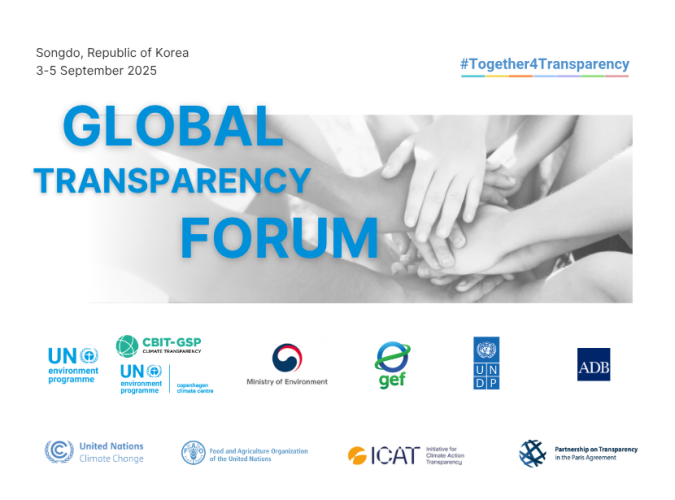Transparency is foundational to strong climate action and the success of the Paris Agreement. 2025 is a crucial year for strengthened climate action through updated pledges backed by greater transparency.
With the 2024 deadline for the first Biennial Transparency Reports (BTRs), the Paris Agreement’s Enhanced Transparency Framework moved from design to operationalisation as countries reported on their climate action progress. This milestone also marked a pivotal moment for countries to reflect on policies and measures, progress towards targets, climate change impacts and adaptation, levels of support and capacity-building needs
As countries are preparing to update their Nationally Determined Contributions (NDCs) ahead of COP30 in Belém, the information, lessons, and trends emerging from the BTRs offer a critical evidence base to inform climate targets.
NDCs or national climate plans - due this year - will be blueprints for economic growth, new jobs, business and investment opportunities, improved human health, energy independence, and increased security.
Many countries face challenges in building sustainable transparency frameworks aligned with national development priorities. This requires transitioning from ad-hoc reporting to government-led transparency systems with strong institutional arrangements, legal frameworks, reliable data, and technical expertise.
In this context, global climate transparency partners are organising the second Global Transparency Forum (GTF) in Songdo, Incheon City, Republic of Korea from the 3rd to 5th of September.
The GTF will provide an opportunity for countries, development partners, and transparency practitioners to exchange experiences, reflect on lessons learned from the first BTR submissions, and explore how transparency efforts can effectively inform the development of their NDCs. The GTF will also strengthen partnerships, enable dialogue on best practices, and identify opportunities for enhancing support under the Enhanced Transparency Framework.
Transparency underpins both the NDC and the BTR processes, yet in many countries they are not well aligned and are implemented as separate workstreams. This creates extra burdens for countries and limits mutual benefits. Integrating the two can help create climate plans that are effective, transparent, data-driven, and aligned with broader national goals.
"Strong climate reporting is a vital enabling tool for governments and economies. It helps build a stronger evidence base to strengthen climate policies and outcomes. It also helps identify funding needs and investment opportunities, thus enabling countries to seize the huge benefits of shifting to clean energy and climate resilient economies,” said UN Climate Change Executive Secretary Simon Stiell.
“Later this year, before COP30, UN Climate Change will be publishing the first BTR Synthesis report, providing important insights into key drivers of implementation and barriers to overcome,” Stiell added.
With over 100 participants, primarily from developing countries the Global Transparency Forum provides an opportunity to increase action on transparency. It will offera space for countries, development partners and transparency practitioners to exchange experiences, explore how transparency efforts can effectively inform NDC 3.0, and build partnerships.
Climate action transparency is essential for unlocking climate finance and supporting long-term development as providing transparent climate action data helps countries attract and align international finance with national priorities.
The GTF will include a High-Level Dialogue with representatives from the COP29 and COP30 Presidencies and other stakeholders, as well as targeted technical sessions with expert speakers and facilitators.
“As countries prepare and communicate their next NDCs and BTRs, we need to build the capacity of developing country Parties to transition from ad hoc reporting approaches to government-led, systematic, and institutionalized processes for preparing and submitting national reports under the ETF,” said COP30 President-Designate André Corrêa do Lago.
Notes for Editors:
BTRs serve as the primary reporting vehicle for countries to communicate their climate action progress and support. BTRs include information on greenhouse gas emissions, policies and measures, progress towards targets, climate change impacts and adaptation, and support received and needed.
NDCs (also known as national climate plans and nationally determined contributions) submitted by countries under the Paris Agreement outline how each country intends to reduce greenhouse gas emissions, adapt to climate impacts, and mobilize the support needed to do so.
For further information on the Global Transparency Forum please contact the United Nations Environment Programme Copenhagen Climate Centre.
- Alexander Ray – Communications Officer - alexander.ray@un.org
- Denis Desgain – Head of Mitigation and Data Management – denis.desgain@un.org
The Global Transparency Forum is hosted by the Government of the Republic of Korea and jointly supported by the United Nations Environment Programme, United Nations Development Programme, the Food and Agriculture Organisation, the United Nations Framework Convention on Climate Change, The Initiative for Climate Action Transparency, the Partnership for Transparency on the Paris Agreement, the Global Environment Facility, the COP 29 Presidency of Azerbaijan, and the Capacity Building Initiative for Transparency – Global Support Programme.
